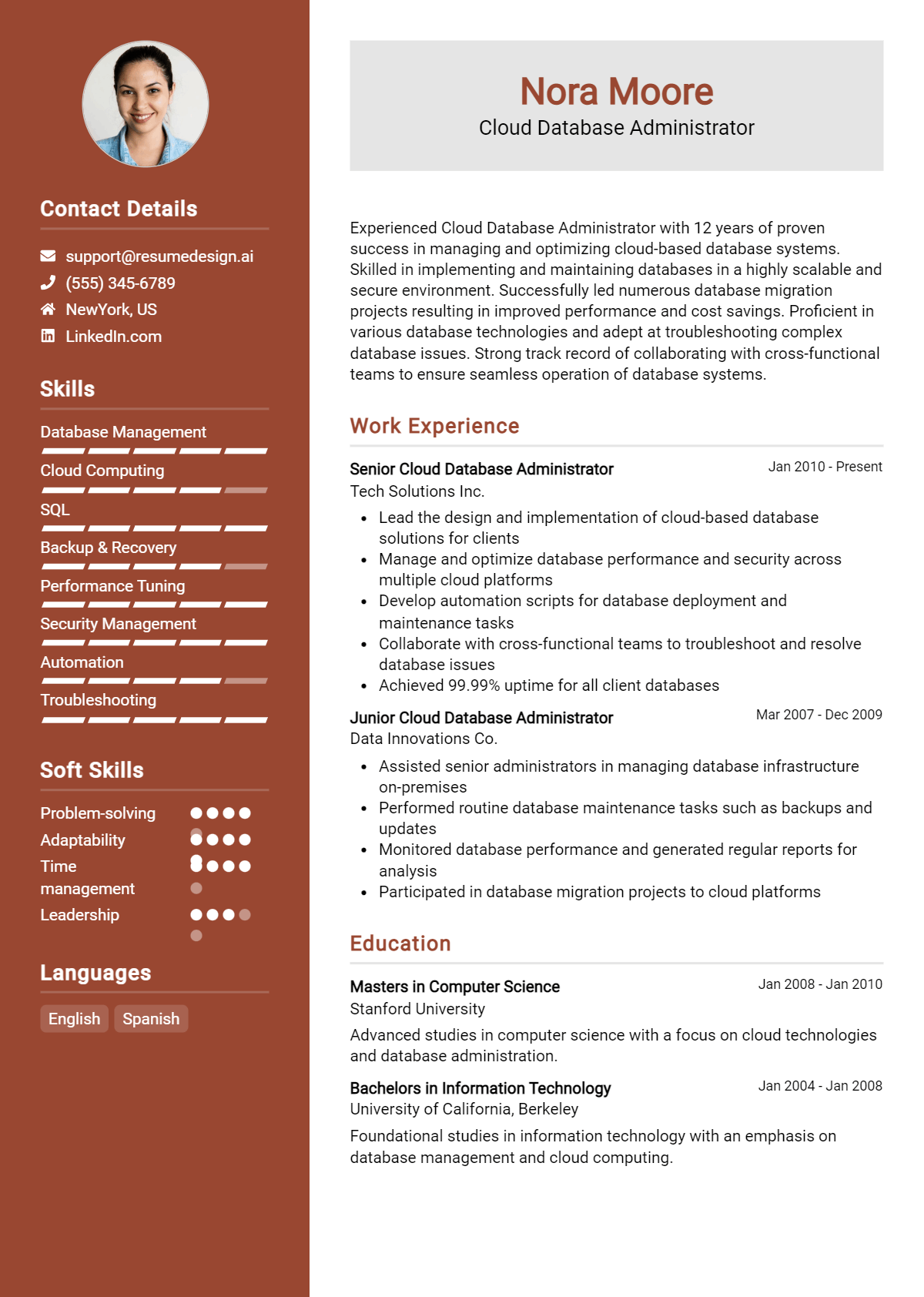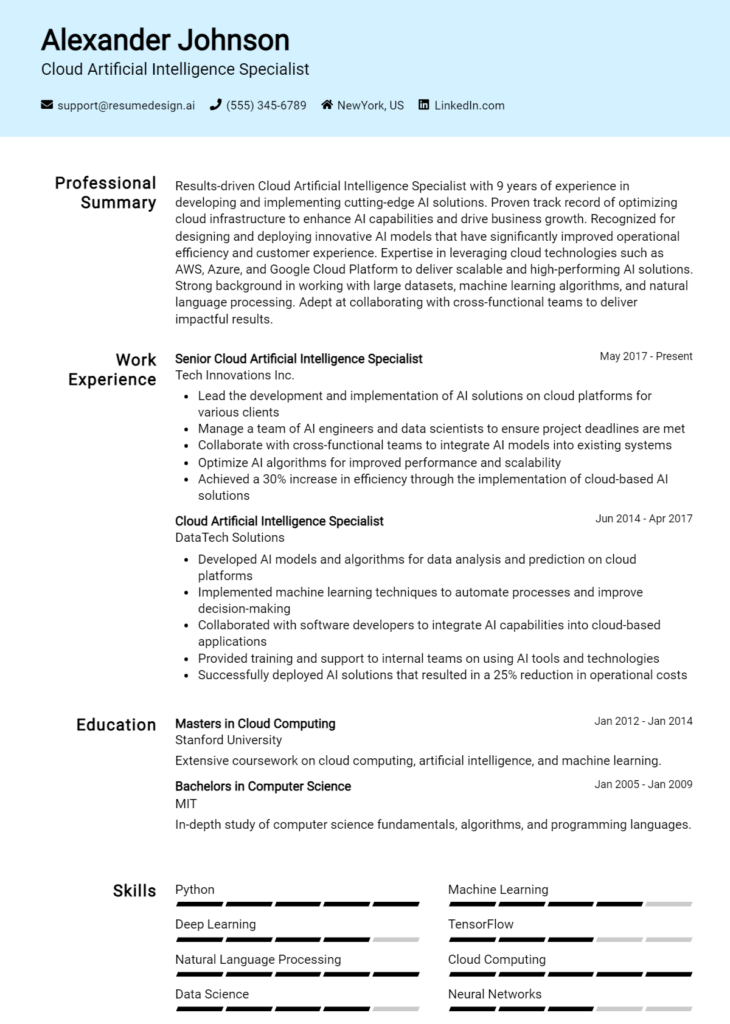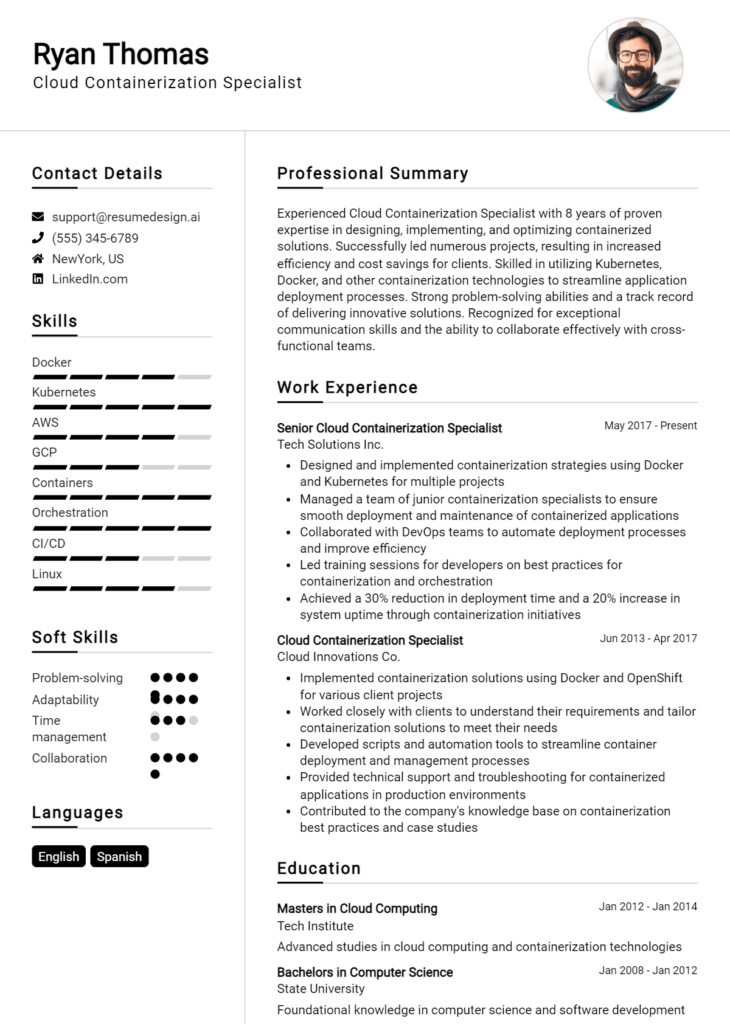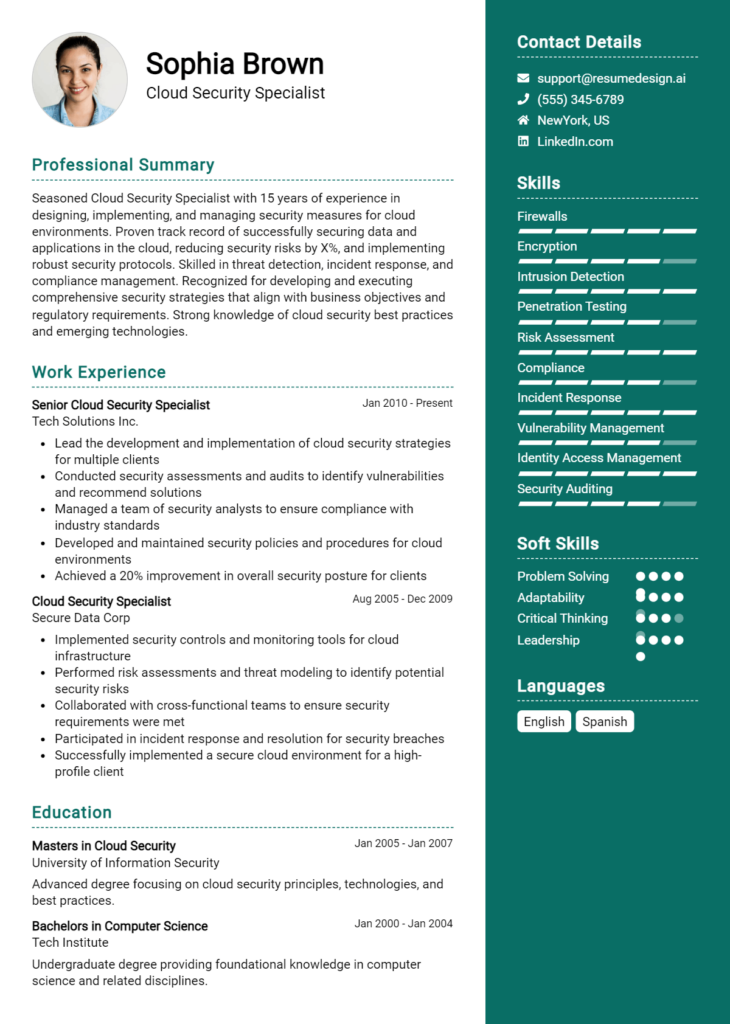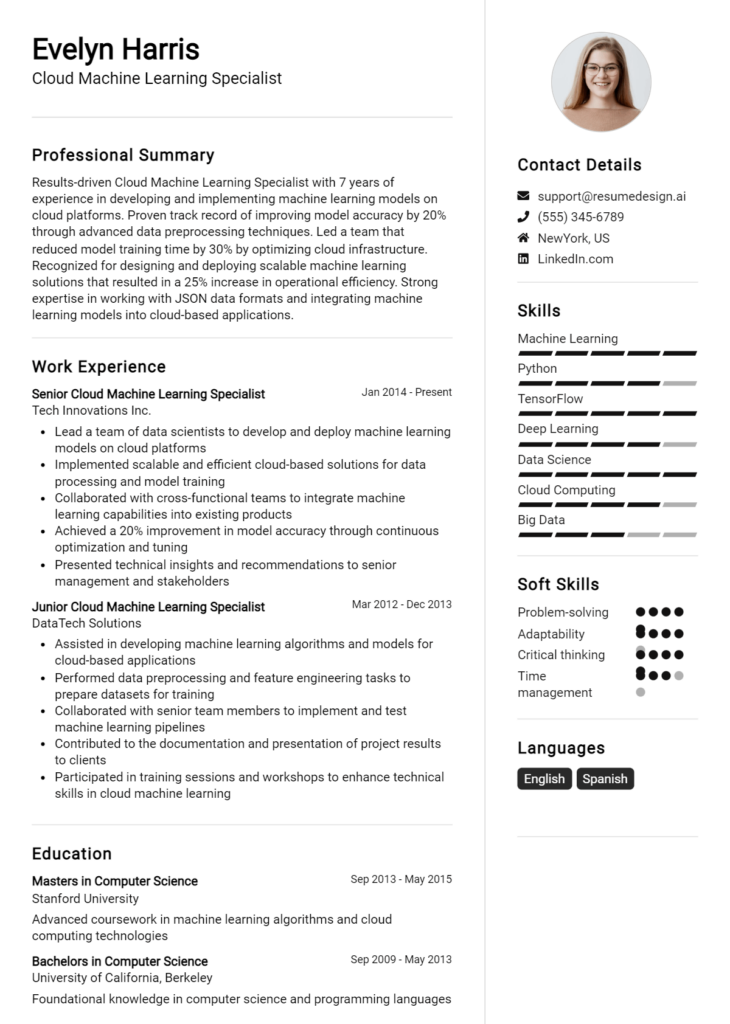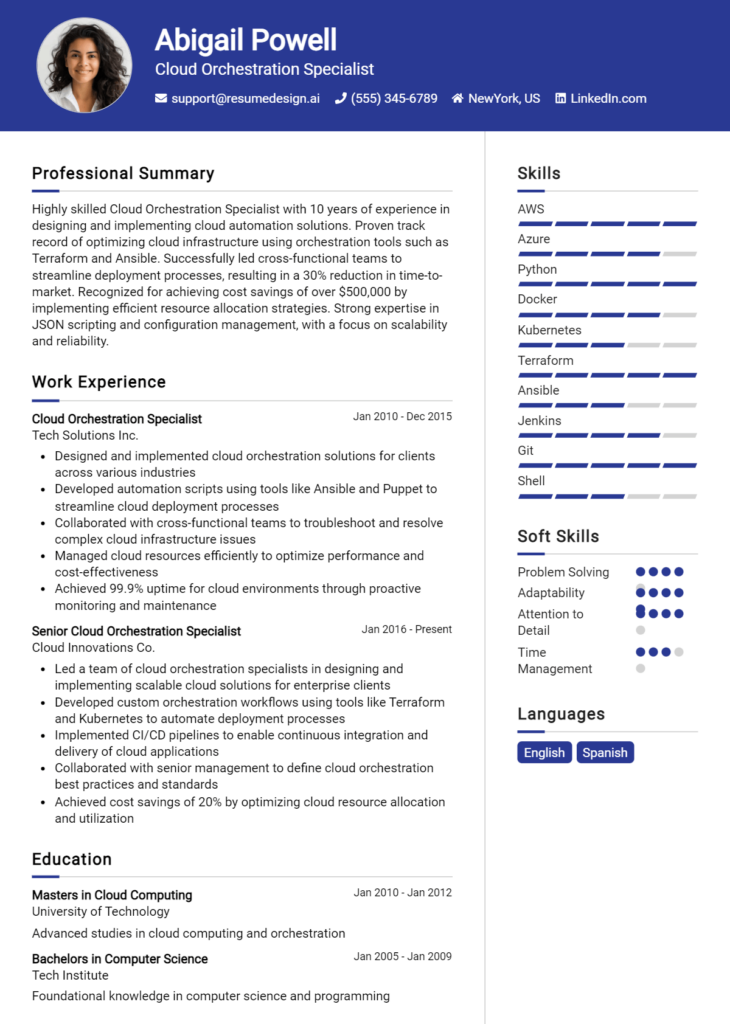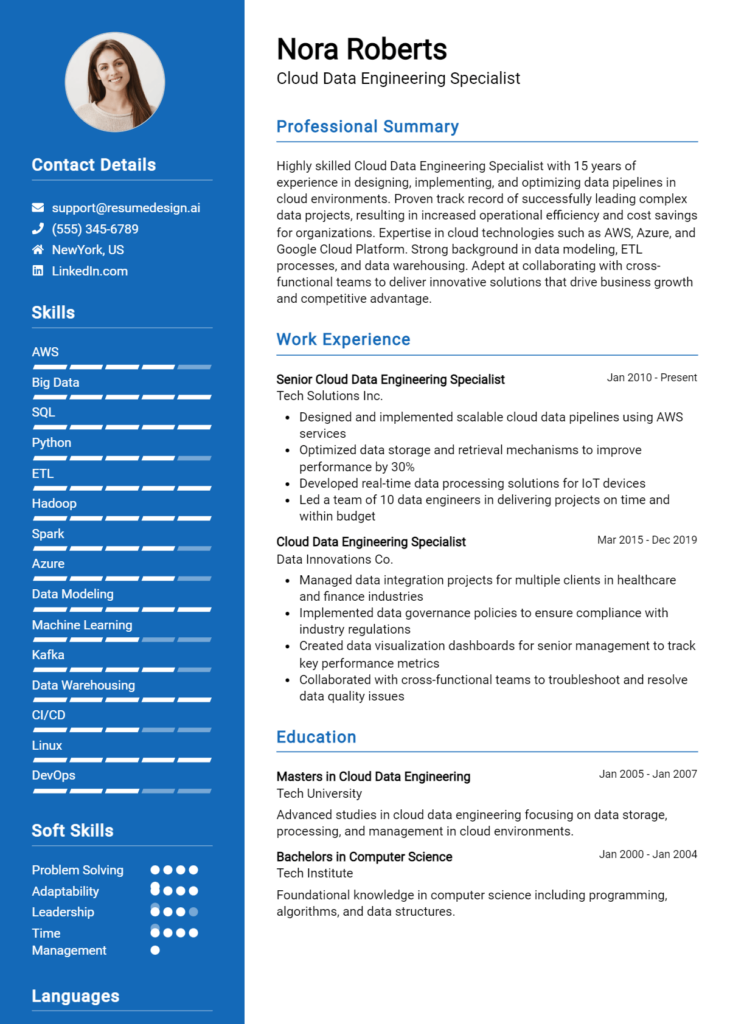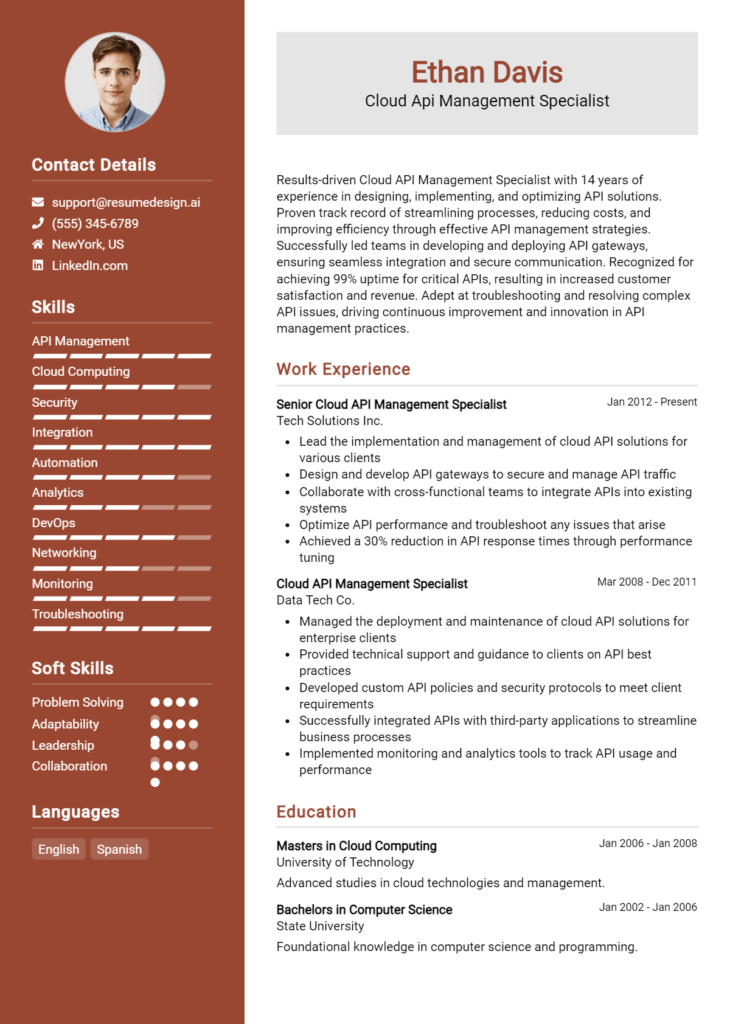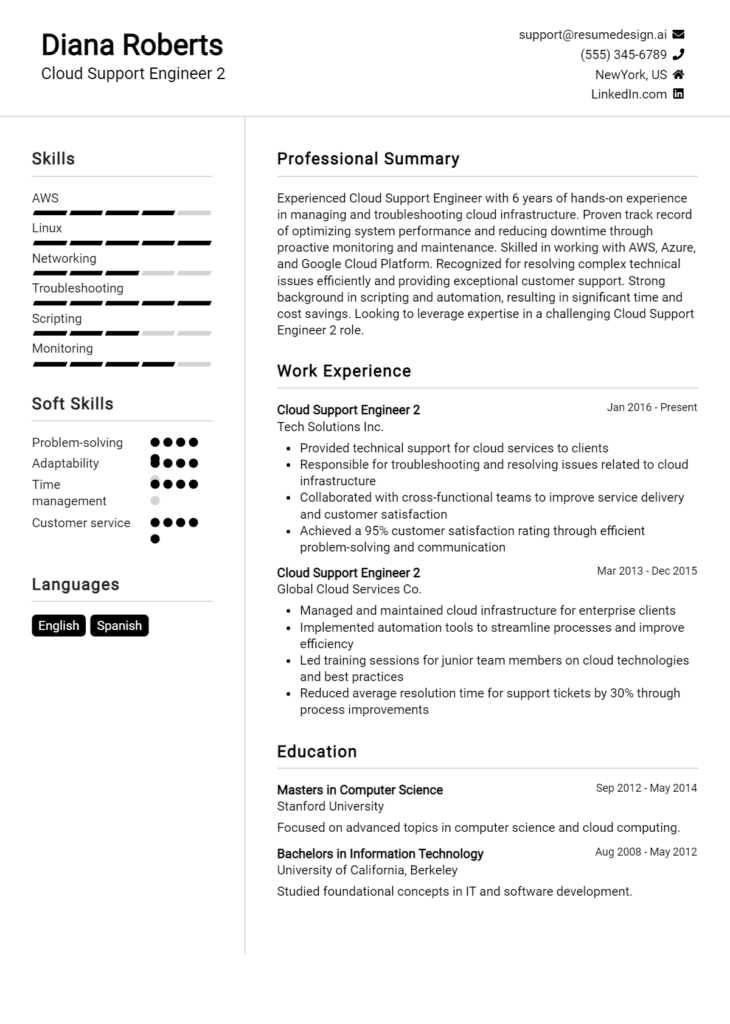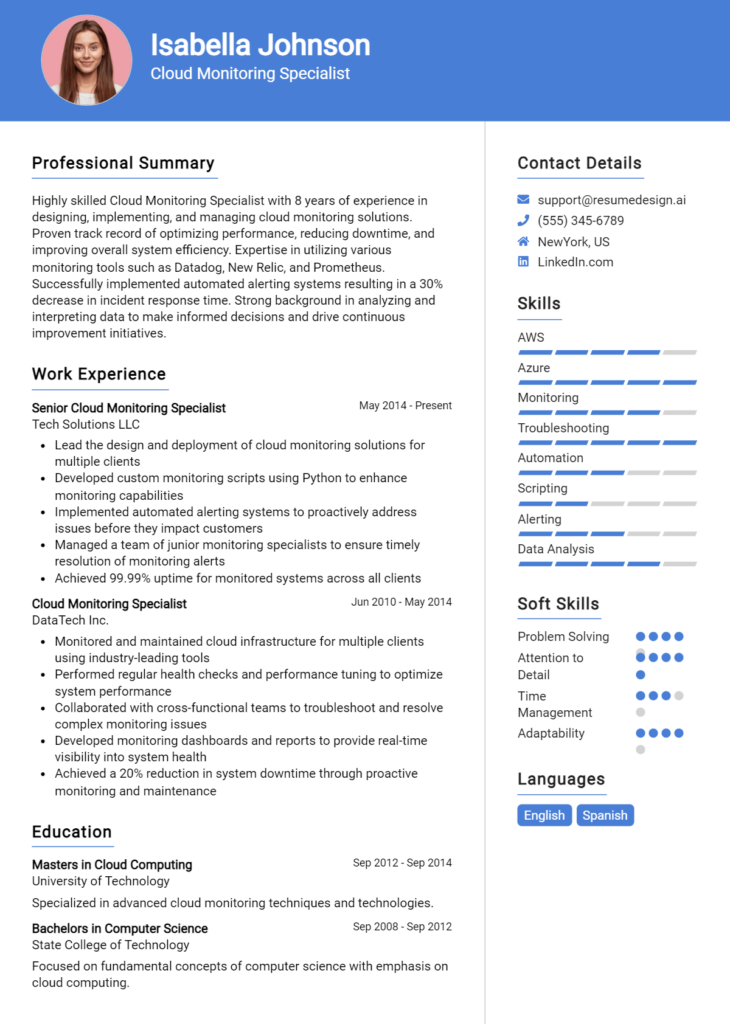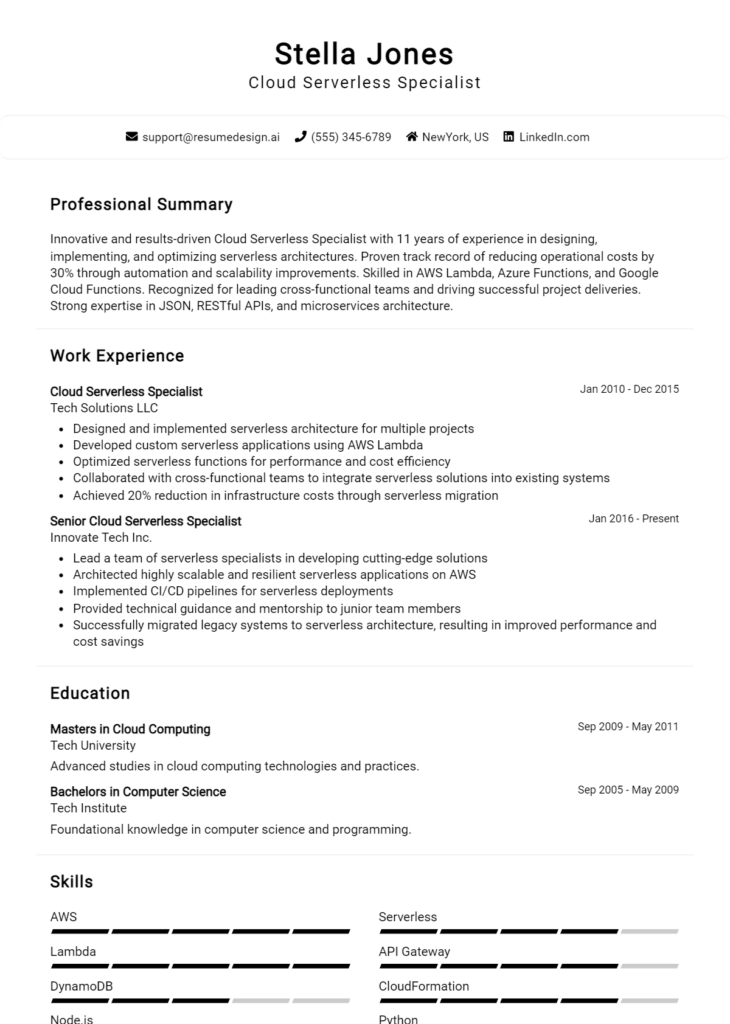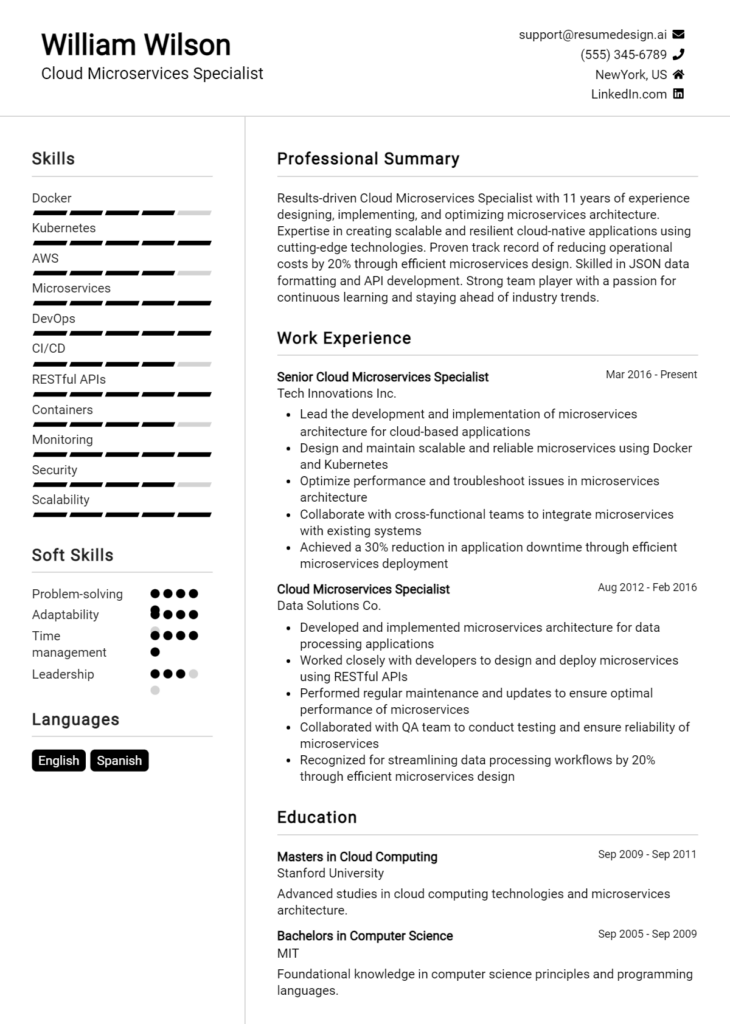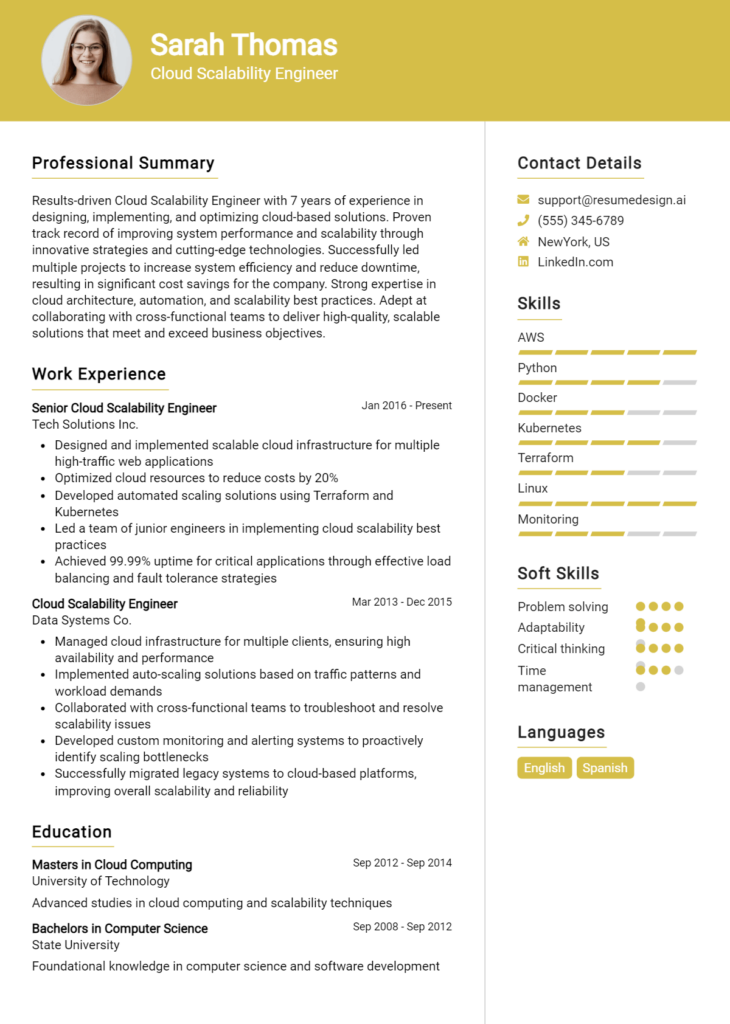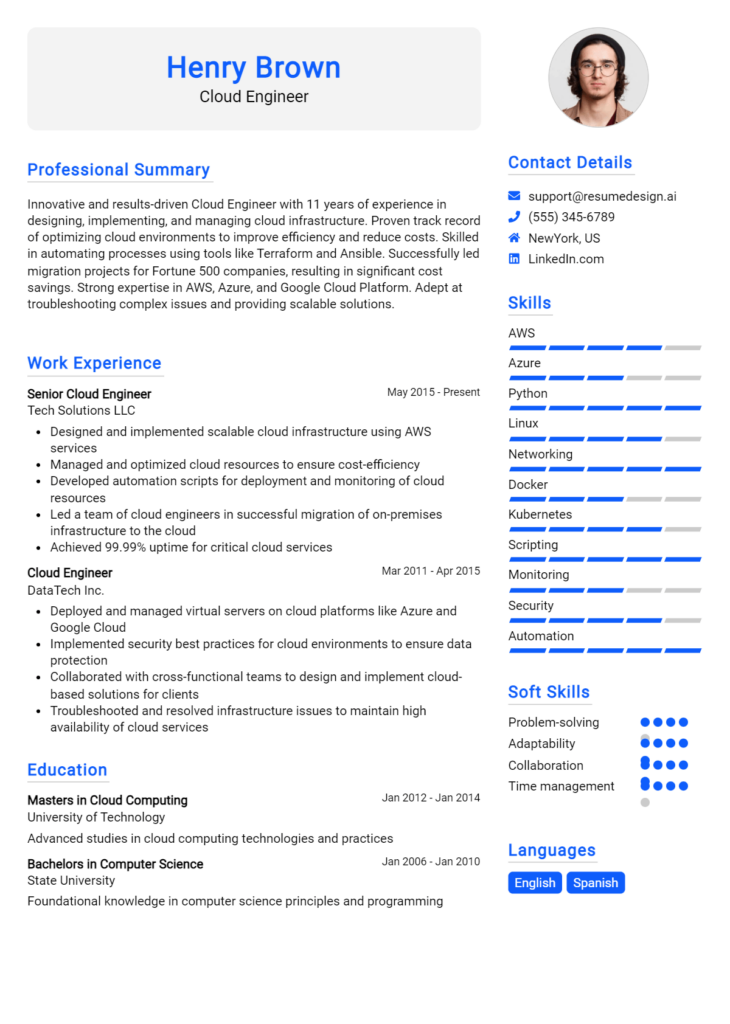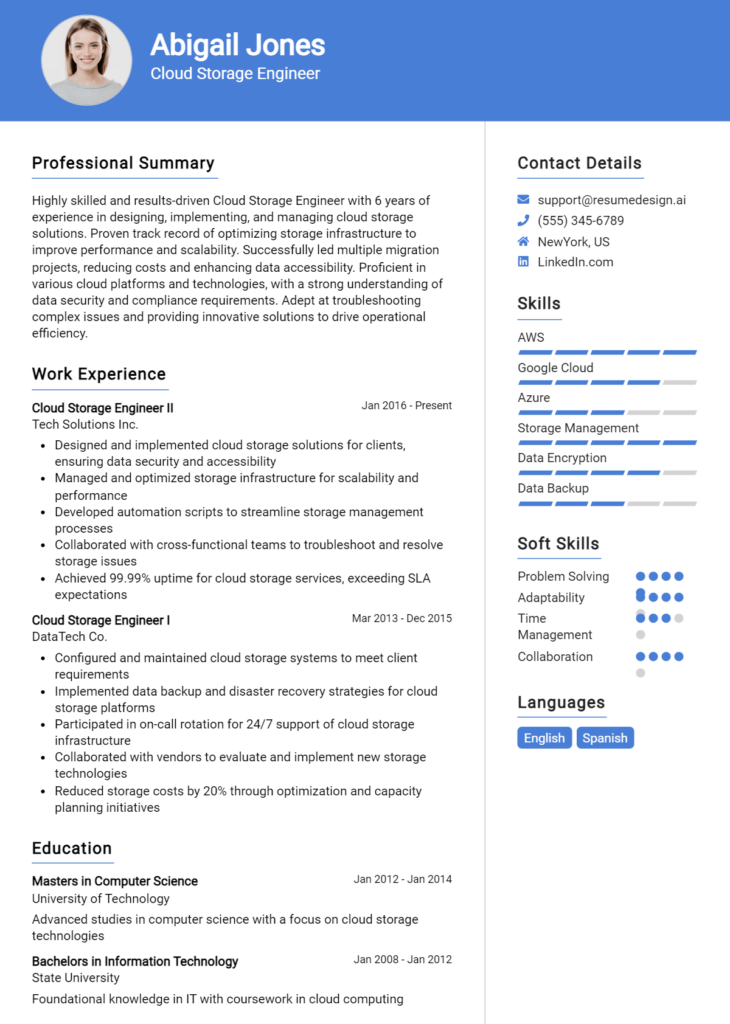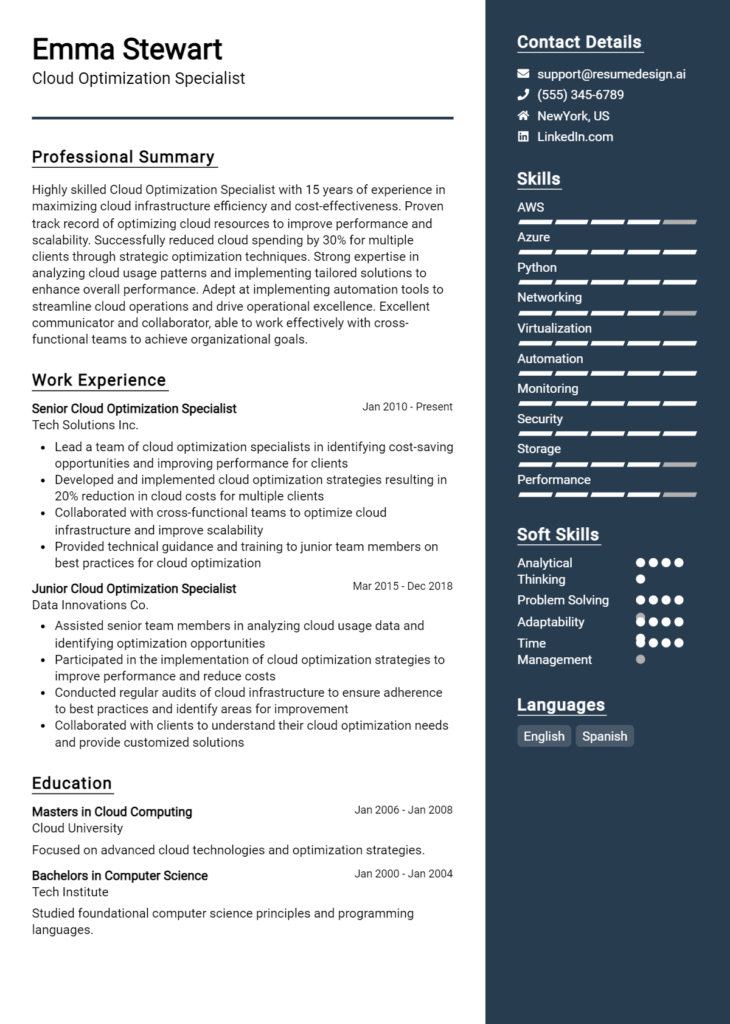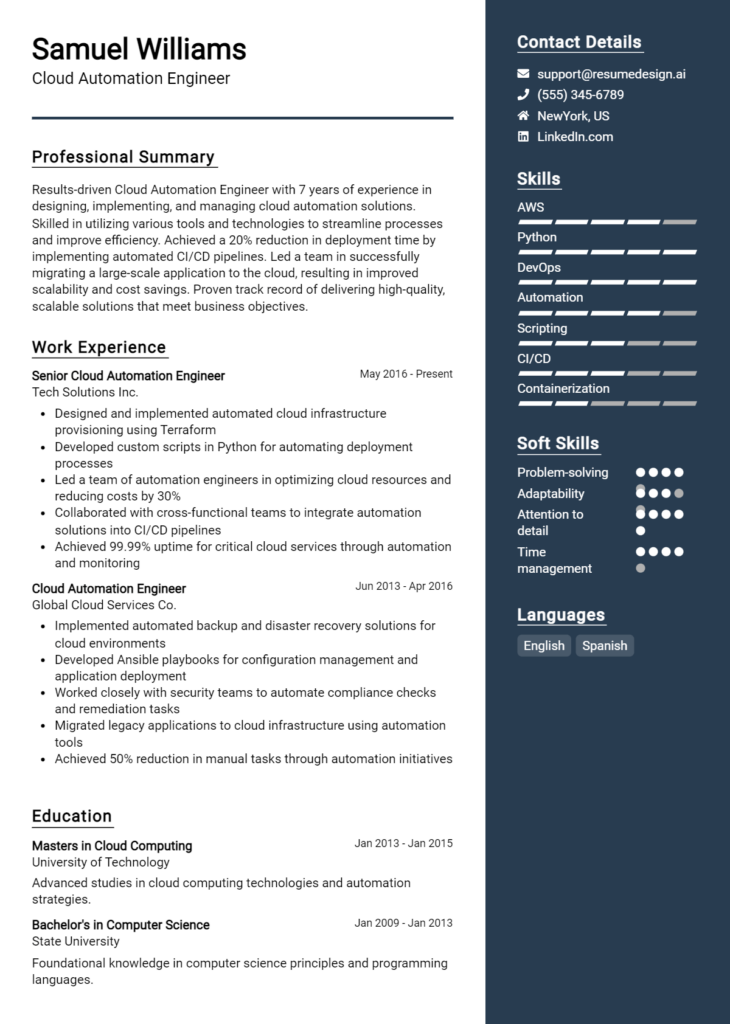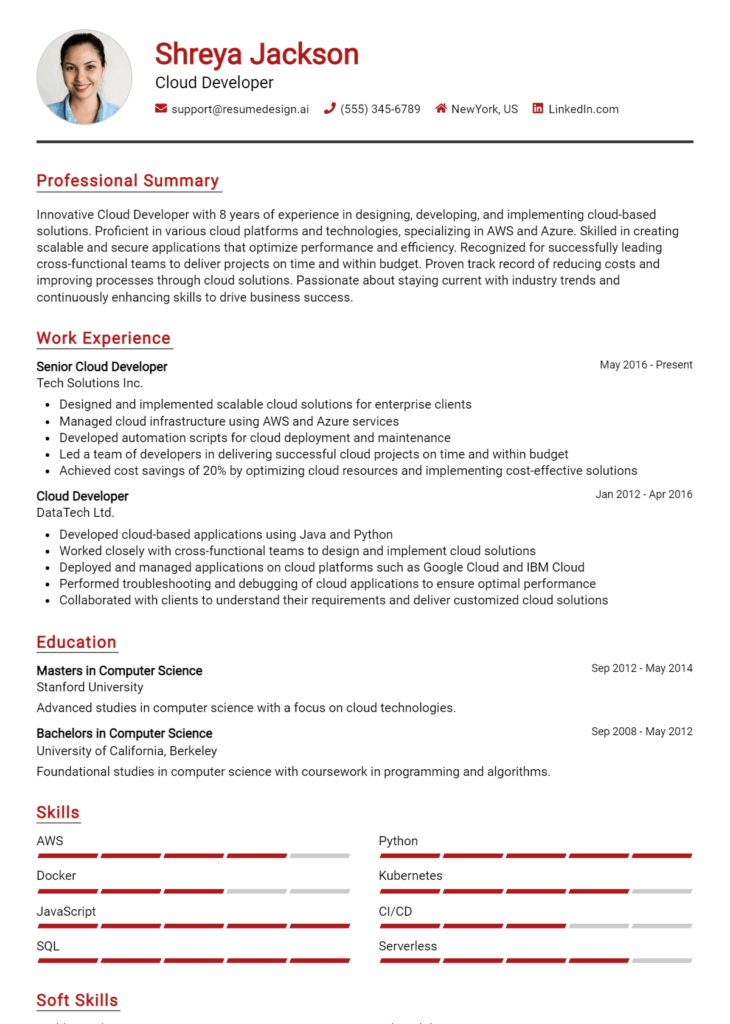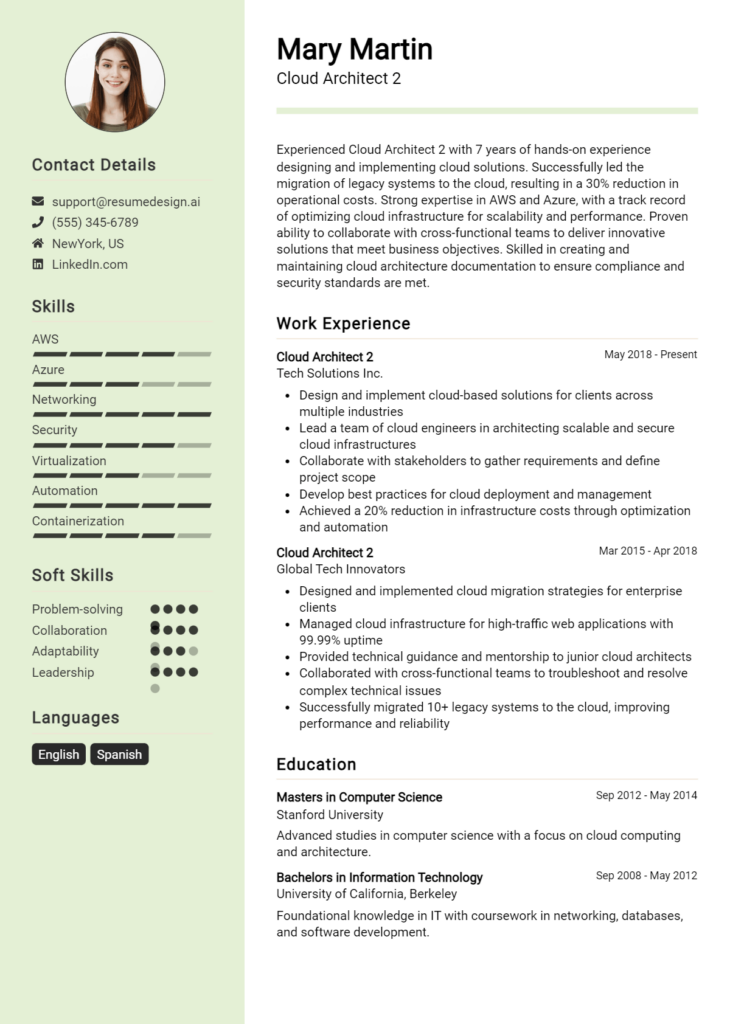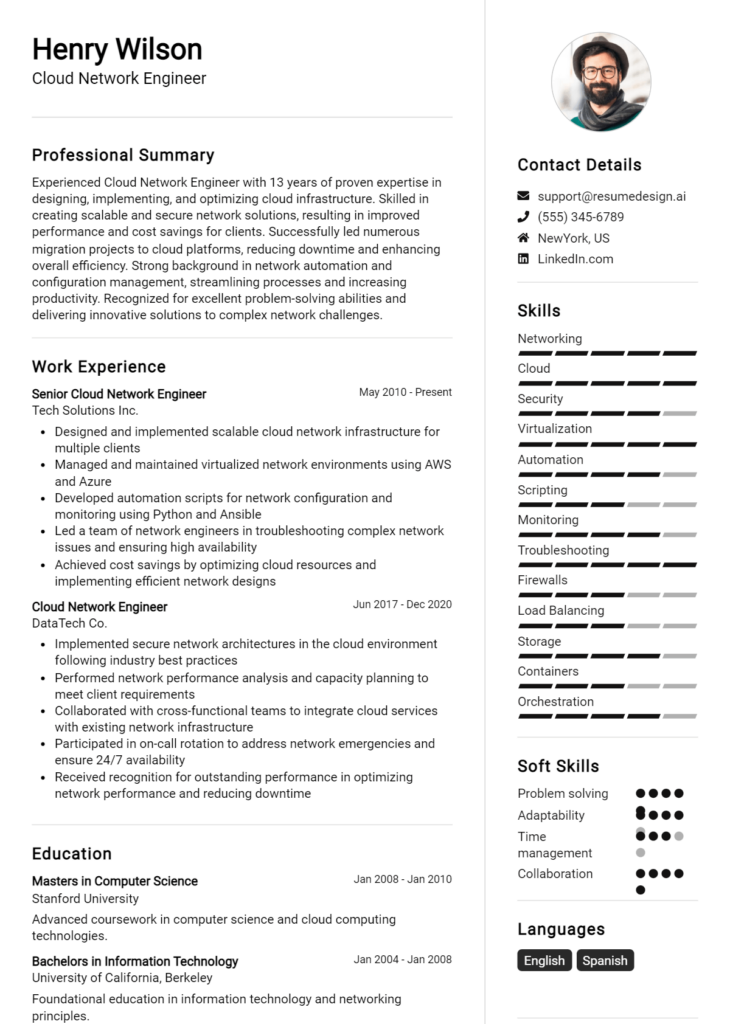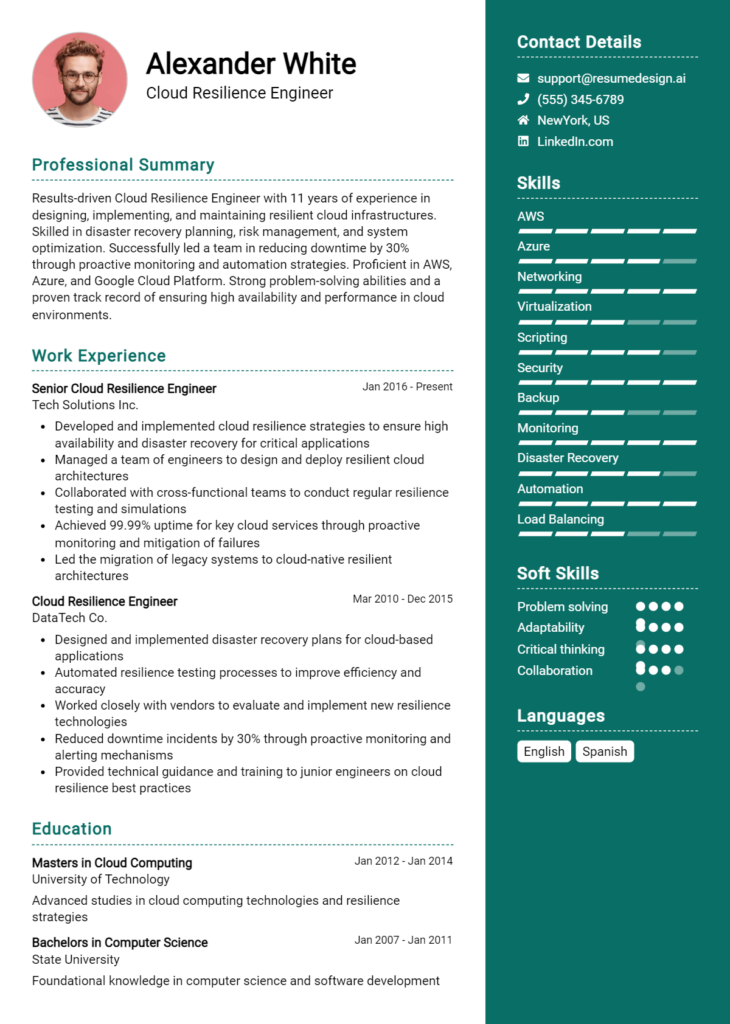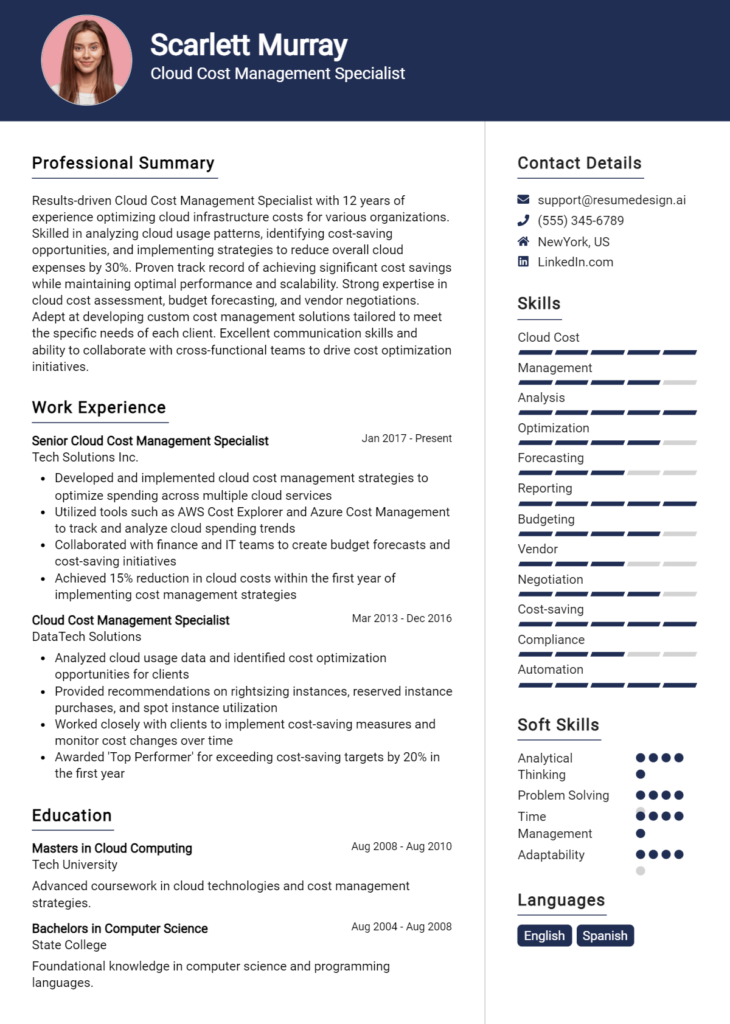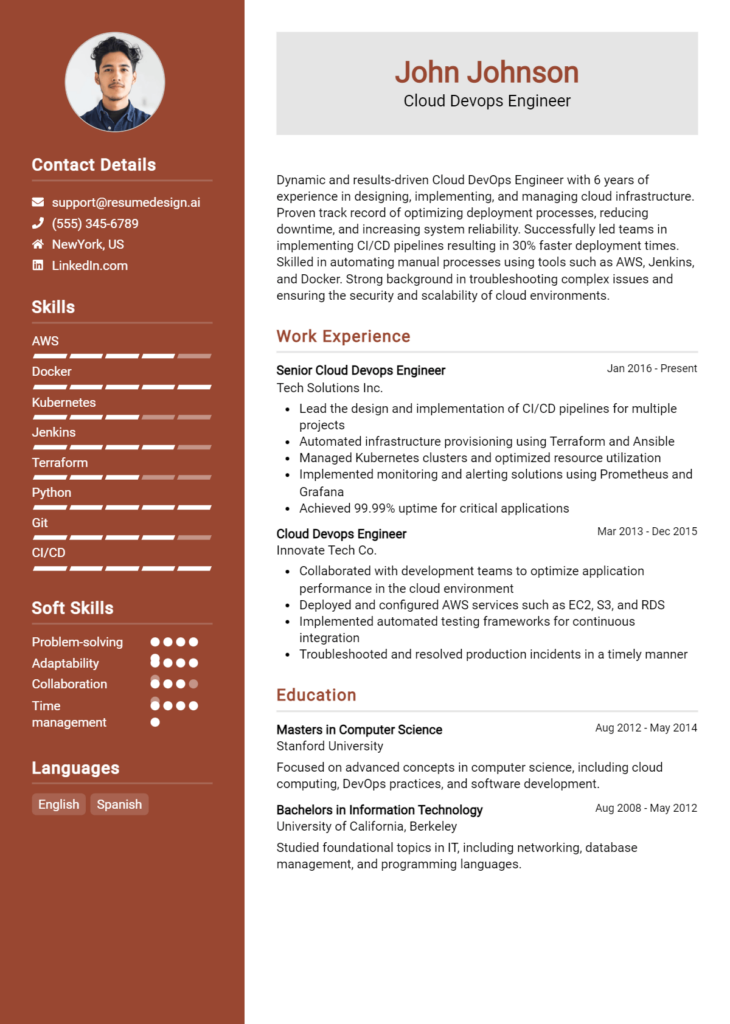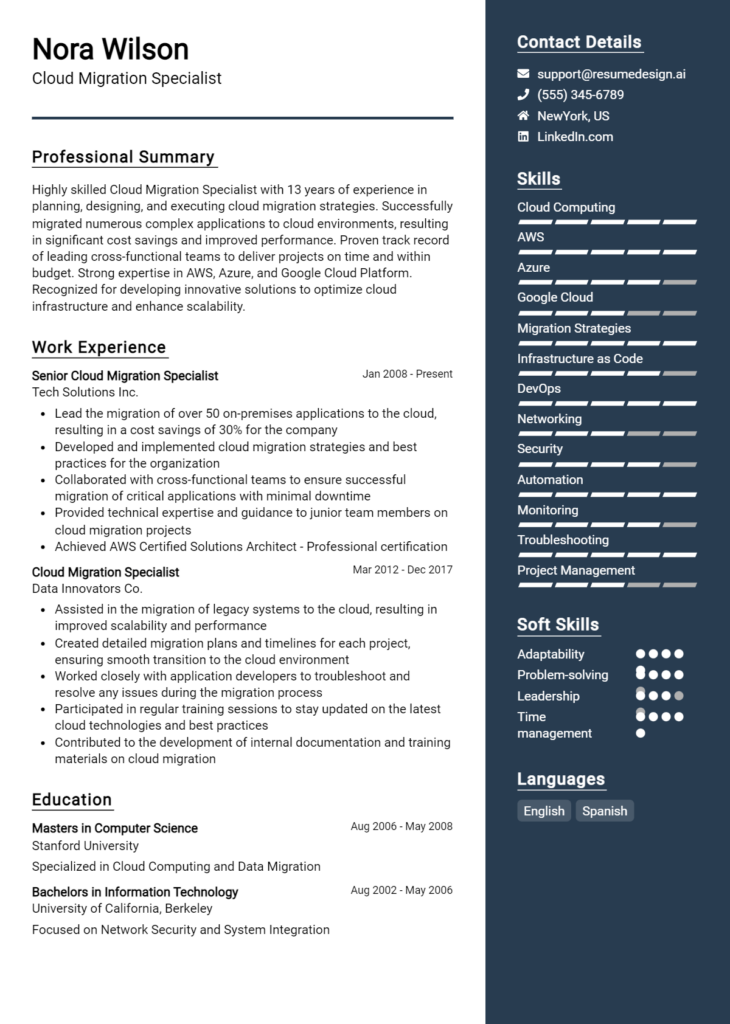Cloud Database Administrator Core Responsibilities
A Cloud Database Administrator (CDBA) plays a crucial role in managing and optimizing cloud-based databases, ensuring data integrity and availability across various departments. Key responsibilities include database design, performance tuning, and security management, requiring strong technical skills in cloud platforms and database technologies. Operational excellence and effective problem-solving abilities are essential for collaborating with IT, development, and business teams, ultimately aligning database management with organizational goals. A well-structured resume can effectively highlight these competencies, showcasing the candidate's value to potential employers.
Common Responsibilities Listed on Cloud Database Administrator Resume
- Designing and implementing cloud database solutions to support business applications.
- Monitoring and optimizing database performance to ensure high availability.
- Managing database security and access controls to protect sensitive data.
- Conducting regular backups and disaster recovery planning for data safety.
- Collaborating with development teams to integrate database solutions into applications.
- Troubleshooting database-related issues and providing timely resolutions.
- Implementing database upgrades and patches to maintain system integrity.
- Documenting database architectures, configurations, and procedures.
- Performing capacity planning and resource allocation for optimal performance.
- Staying updated on industry trends and emerging technologies in cloud databases.
- Conducting regular audits to ensure compliance with data governance policies.
High-Level Resume Tips for Cloud Database Administrator Professionals
In today's competitive job market, a well-crafted resume is essential for Cloud Database Administrator professionals seeking to make their mark. As the first impression a candidate makes on a potential employer, your resume needs to effectively showcase not only your technical skills but also your achievements and experience in managing cloud databases. A strong resume can set you apart from other candidates, demonstrating your expertise in cloud technologies and your ability to optimize database performance. This guide will provide practical and actionable resume tips specifically tailored for Cloud Database Administrator professionals, helping you to put your best foot forward in your job search.
Top Resume Tips for Cloud Database Administrator Professionals
- Tailor your resume to the specific job description by incorporating relevant keywords and phrases from the posting.
- Highlight your experience with cloud platforms such as AWS, Azure, or Google Cloud, and detail your familiarity with their database services.
- Quantify your achievements, using metrics and outcomes to demonstrate the impact of your work, such as improved performance or cost savings.
- Showcase your proficiency in database management tools and languages, such as SQL, NoSQL, and database migration techniques.
- Include certifications relevant to cloud database management, like AWS Certified Database Specialty or Microsoft Azure Database Administrator Associate.
- Detail your experience with backup and recovery strategies, emphasizing your role in ensuring data integrity and availability.
- Demonstrate your ability to collaborate with cross-functional teams, highlighting any projects where you worked with developers or system architects.
- List any experience with automation tools or scripts that streamline database management tasks, showcasing your efficiency and innovative thinking.
- Keep your resume concise and focused, ideally one to two pages, making it easy for employers to quickly see your qualifications.
By implementing these tips, you can significantly increase your chances of landing a job in the Cloud Database Administrator field. A resume that clearly communicates your skills, experience, and achievements will not only attract the attention of hiring managers but also position you as a strong candidate for roles within this growing and dynamic industry.
Why Resume Headlines & Titles are Important for Cloud Database Administrator
In the competitive landscape of cloud database administration, crafting an effective resume is crucial for standing out among numerous applicants. A compelling resume headline or title serves as the first impression a hiring manager receives, acting as a powerful summary of a candidate's key qualifications and strengths. This strategic phrase not only captures attention but also conveys relevance to the specific role being applied for. When done well, a concise and impactful headline can set the tone for the rest of the resume, guiding the hiring manager to see the candidate as a strong fit for the position.
Best Practices for Crafting Resume Headlines for Cloud Database Administrator
- Keep it concise: Aim for one impactful sentence that summarizes your qualifications.
- Be role-specific: Tailor the headline to the Cloud Database Administrator position to highlight your fit.
- Highlight key skills: Include technical skills or certifications relevant to cloud databases.
- Showcase experience: Mention years of experience or notable achievements in database management.
- Use action-oriented language: Start with strong action verbs to convey your proactive approach.
- Incorporate keywords: Use industry-specific terms that align with the job description to enhance visibility.
- Focus on your unique selling points: Identify what sets you apart from other candidates.
- Avoid jargon or clichés: Stay clear of overused phrases that don't add value to your headline.
Example Resume Headlines for Cloud Database Administrator
Strong Resume Headlines
"Experienced Cloud Database Administrator Specializing in AWS and Azure Solutions"
“Certified Cloud Database Expert with 8+ Years of Experience in Optimizing Data Performance”
“Proficient Cloud DBA with Proven Track Record in Database Migration and Security Enhancements”
Weak Resume Headlines
“Database Administrator Looking for Work”
“IT Professional with Some Experience”
The strong headlines effectively convey specific qualifications and expertise, immediately informing the hiring manager of the candidate's relevant skills and experience in cloud database administration. They are tailored, impactful, and designed to resonate with the job description, making it easy for employers to recognize the value the candidate brings. In contrast, the weak headlines lack specificity and fail to highlight any unique strengths, making them forgettable and less compelling in a competitive job market.
Writing an Exceptional Cloud Database Administrator Resume Summary
A well-crafted resume summary is crucial for a Cloud Database Administrator as it serves as the first impression for hiring managers. This brief section should succinctly encapsulate the candidate's key skills, relevant experience, and notable accomplishments, all tailored to the job in question. A strong summary not only captures attention quickly but also sets the tone for the rest of the resume, demonstrating the candidate's suitability for the role. By being concise and impactful, the summary can effectively highlight the candidate's value and encourage further review of their qualifications.
Best Practices for Writing a Cloud Database Administrator Resume Summary
- Quantify Achievements: Use specific metrics to demonstrate success, such as improved database performance or reduced downtime.
- Focus on Skills: Highlight technical skills relevant to cloud database management, such as SQL proficiency, cloud platforms (e.g., AWS, Azure), and database security.
- Tailor to the Job Description: Customize the summary to reflect keywords and requirements from the job posting.
- Keep it Concise: Aim for 2-4 sentences that deliver maximum impact without unnecessary detail.
- Showcase Relevant Experience: Mention key roles held, particularly those that directly relate to cloud database administration.
- Highlight Certifications: If applicable, include any relevant certifications, such as AWS Certified Database Specialty or Microsoft Certified: Azure Database Administrator Associate.
- Use Action-Oriented Language: Start sentences with strong action verbs to convey confidence and capability.
- Convey Passion for Technology: Briefly express enthusiasm for cloud technologies and database innovations.
Example Cloud Database Administrator Resume Summaries
Strong Resume Summaries
"Results-driven Cloud Database Administrator with over 5 years of experience managing cloud-based databases on AWS, achieving 99.99% uptime while reducing operational costs by 20% through optimized resource allocation."
"Detail-oriented Cloud Database Administrator specializing in Azure SQL databases, with a proven track record of enhancing database performance by 30% and successfully leading migration projects for enterprise-level clients."
"Certified AWS Database Specialist with expertise in automating database backup processes, resulting in a 40% reduction in recovery time. Adept at ensuring data security and compliance in cloud environments."
Weak Resume Summaries
"Experienced database administrator looking for a new opportunity in the cloud field."
"Skilled in various database technologies and interested in cloud solutions."
The examples of strong resume summaries stand out because they include quantifiable achievements, specific technical skills, and relevant experience directly related to the Cloud Database Administrator role. They convey a clear value proposition that aligns with the needs of potential employers. In contrast, the weak summaries are vague and generic, lacking measurable outcomes and failing to provide a clear picture of the candidate's capabilities, which diminishes their impact in a competitive job market.
Work Experience Section for Cloud Database Administrator Resume
The work experience section of a Cloud Database Administrator resume is pivotal in showcasing a candidate's technical proficiency, leadership capabilities, and commitment to delivering high-quality products. This section not only highlights relevant skills and previous job responsibilities but also demonstrates the candidate's ability to manage teams effectively and contribute to successful project outcomes. By quantifying achievements and aligning experiences with industry standards, candidates can provide tangible evidence of their expertise, making their application stand out to potential employers.
Best Practices for Cloud Database Administrator Work Experience
- Highlight relevant technical skills such as database management, cloud platforms, and performance tuning.
- Use specific metrics to quantify achievements, such as reduction in downtime or improvements in database performance.
- Emphasize collaboration by detailing experiences working with development teams and other stakeholders.
- Include certifications and training that align with industry standards to demonstrate ongoing professional development.
- Tailor experiences to match the job description, focusing on the most relevant and impactful roles.
- Utilize action verbs to convey responsibility and initiative in past roles.
- Showcase problem-solving skills through examples of challenges faced and solutions implemented.
- Describe leadership roles in projects or teams to emphasize management capabilities.
Example Work Experiences for Cloud Database Administrator
Strong Experiences
- Led a cross-functional team to migrate 100+ databases to AWS, achieving a 30% reduction in operational costs and a 40% improvement in query performance.
- Implemented automated backup solutions that decreased recovery time objectives (RTO) from 12 hours to under 1 hour, enhancing data reliability and availability.
- Designed and managed a multi-tenant database architecture that supported 500,000+ users, resulting in a 99.99% uptime over three years.
- Collaborated with development teams to optimize database queries, leading to a 25% increase in application performance and user satisfaction ratings.
Weak Experiences
- Worked on database management tasks.
- Participated in team meetings regarding cloud solutions.
- Helped with some database migrations.
- Managed a few database backups occasionally.
The examples of strong experiences are considered effective because they provide specific metrics, demonstrate leadership, and showcase collaboration with measurable results. In contrast, the weak experiences lack detail, specificity, and quantifiable outcomes, making it difficult for potential employers to gauge the candidate's true capabilities and contributions in their previous roles.
Education and Certifications Section for Cloud Database Administrator Resume
The education and certifications section of a Cloud Database Administrator resume is crucial as it underscores the candidate's academic achievements, relevant certifications, and commitment to continuous professional development. This section not only highlights formal education but also showcases industry-relevant certifications and specialized training that align with the demands of the cloud database management field. By providing details about relevant coursework and advanced credentials, candidates can significantly enhance their credibility and demonstrate their preparedness for the technical challenges associated with the role.
Best Practices for Cloud Database Administrator Education and Certifications
- Include only relevant degrees and certifications that pertain to cloud computing, database management, or information technology.
- Provide details of coursework that directly relates to cloud database administration, such as database design, cloud architecture, and data security.
- Highlight advanced or industry-recognized credentials, such as AWS Certified Database Specialty or Google Cloud Professional Database Engineer.
- List certifications in order of relevance, placing the most pertinent ones at the top.
- Incorporate dates to demonstrate the recency of certifications and any ongoing education efforts.
- Consider including any relevant training, workshops, or boot camps that focus on cloud technologies and database management.
- Keep descriptions concise while providing enough detail to convey the significance of each qualification.
- Use clear formatting to enhance readability and ensure easy access to critical information.
Example Education and Certifications for Cloud Database Administrator
Strong Examples
- Bachelor of Science in Computer Science, University of XYZ, Graduated May 2021
- AWS Certified Database Specialty, Issued August 2023
- Google Cloud Professional Database Engineer Certification, Achieved January 2023
- Coursework: Database Management Systems, Cloud Computing Essentials, Data Warehousing
Weak Examples
- Associate Degree in General Studies, Community College of ABC, Graduated May 2019
- Certification in Microsoft Office Suite, Completed June 2022
- Completed a workshop on Basic Computer Skills, June 2021
- Degree in Graphic Design, University of DEF, Graduated December 2020
The strong examples demonstrate a direct alignment with the skills and knowledge required for a Cloud Database Administrator role, showcasing relevant degrees and certifications that enhance the candidate’s qualifications. In contrast, the weak examples include irrelevant educational qualifications and outdated certifications that do not contribute to the candidate's suitability for the position, thereby diminishing their appeal to potential employers.
Top Skills & Keywords for Cloud Database Administrator Resume
As a Cloud Database Administrator, the importance of showcasing relevant skills on your resume cannot be overstated. In a field that is constantly evolving, having a well-defined skill set not only highlights your technical expertise but also demonstrates your ability to adapt to new challenges. Employers look for candidates who possess a balanced mix of hard and soft skills, as these attributes are crucial for managing complex database environments and ensuring seamless data accessibility and security. A robust resume that effectively communicates your skills can significantly enhance your chances of landing an interview and ultimately securing the position.
Top Hard & Soft Skills for Cloud Database Administrator
Soft Skills
- Analytical Thinking
- Problem Solving
- Attention to Detail
- Communication Skills
- Team Collaboration
- Time Management
- Adaptability
- Critical Thinking
- Customer Service Orientation
- Project Management
Hard Skills
- Proficiency in SQL and NoSQL databases
- Cloud Platforms (AWS, Azure, Google Cloud)
- Database Design and Architecture
- Backup and Recovery Solutions
- Performance Tuning and Optimization
- Security Management
- Data Migration Techniques
- Monitoring and Troubleshooting Tools
- Automation and Scripting (Python, PowerShell)
- Knowledge of DevOps Practices
For a more comprehensive understanding of how to effectively present your skills and work experience, be sure to explore these additional resources.
Stand Out with a Winning Cloud Database Administrator Cover Letter
Dear [Hiring Manager's Name],
I am writing to express my interest in the Cloud Database Administrator position at [Company Name], as advertised on [where you found the job listing]. With a robust background in database management and cloud technologies, I am excited about the opportunity to contribute to your team and help optimize your database systems. My experience in managing and securing cloud-based databases aligns perfectly with your requirements, and I am eager to bring my skills in performance tuning, data migration, and disaster recovery to enhance [Company Name]'s data infrastructure.
In my previous role at [Your Previous Company], I successfully managed a multi-cloud database environment, ensuring high availability and scalability for critical applications. I implemented best practices for database monitoring, automated backups, and security protocols that reduced downtime by 30% and improved overall system performance. My proficiency with tools such as AWS RDS, Azure SQL Database, and Google Cloud SQL, combined with my strong analytical skills, has equipped me to troubleshoot issues effectively and optimize database performance. I am particularly drawn to [Company Name]’s commitment to innovation and excellence in technology, and I am excited about the opportunity to leverage my expertise to drive similar success.
Collaboration is at the heart of my work ethic. I thrive in team-oriented environments and have effectively worked alongside developers, data engineers, and IT security teams to ensure seamless integration of database solutions. I am also committed to staying up-to-date with the latest industry trends and technologies, which I believe is crucial in the ever-evolving landscape of cloud computing. My passion for continuous learning drives me to pursue certifications and training that bolster my knowledge and expertise, ensuring that I remain a valuable asset to my team.
Thank you for considering my application. I am enthusiastic about the possibility of contributing to [Company Name] as a Cloud Database Administrator and am eager to discuss how my background, skills, and certifications can align with the goals of your team. I look forward to the opportunity for an interview to further explore how I can help enhance your cloud database capabilities.
Sincerely,
[Your Name]
[Your Phone Number]
[Your Email Address]
Common Mistakes to Avoid in a Cloud Database Administrator Resume
When crafting a resume for the role of a Cloud Database Administrator, it's essential to present your skills and experiences in the best light. However, many candidates make common mistakes that can undermine their chances of landing an interview. Avoiding these pitfalls can significantly enhance the effectiveness of your resume and make you stand out to potential employers. Here are some common mistakes to steer clear of:
Generic Objective Statement: Using a vague or generic objective statement does not demonstrate your specific interest in the position. Tailor your objective to align with the company's goals and the job description.
Ignoring Keywords: Failing to incorporate relevant keywords from the job posting can lead to your resume being overlooked by Applicant Tracking Systems (ATS). Make sure to include terms related to cloud technologies, database management, and specific software tools.
Overloading with Technical Jargon: While technical skills are crucial for a Cloud Database Administrator, excessive jargon without context can confuse hiring managers. Balance technical language with clear explanations of your skills and experiences.
Lack of Quantifiable Achievements: Simply listing job duties without quantifying your achievements can weaken your resume. Use metrics to showcase your impact, such as improved database performance or reduced downtime.
Neglecting Soft Skills: Cloud Database Administrators need strong problem-solving abilities and communication skills. Failing to highlight these soft skills can make your resume seem one-dimensional. Include examples that illustrate your interpersonal and analytical skills.
Formatting Issues: A cluttered or poorly formatted resume can detract from your qualifications. Use clear headings, bullet points, and consistent font styles to enhance readability and ensure a professional appearance.
Omitting Relevant Certifications: Cloud technologies are constantly evolving, and certifications can validate your expertise. Omitting relevant certifications like AWS Certified Database Specialty or Microsoft Azure Database Administrator can diminish your credibility.
Not Tailoring for the Cloud: Focusing solely on traditional database management experience without emphasizing cloud-specific skills can be a major oversight. Highlight your experience with cloud platforms, such as AWS, Azure, or Google Cloud, to demonstrate your adaptability and relevance in the field.
Conclusion
As we have explored the essential responsibilities and skills of a Cloud Database Administrator, it's clear that this role is crucial in managing and optimizing cloud-based database systems. Key points covered include the importance of understanding various cloud platforms, database management, security protocols, and performance tuning. Additionally, we highlighted the need for continuous learning to keep up with evolving technologies and best practices in cloud database management.
With the competitive nature of the job market, having a well-crafted resume can make all the difference in standing out to potential employers. We encourage you to take the time to review and update your Cloud Database Administrator resume. Utilize available resources to enhance your application:
- Explore resume templates to find a professional layout that suits your style and expertise.
- Try out the resume builder for an easy and efficient way to create a personalized resume.
- Check out resume examples for inspiration and ideas on how to present your experience and skills effectively.
- Don’t forget to complement your resume with a strong introduction using cover letter templates designed to grab attention.
Take action today and ensure your resume reflects your qualifications and readiness for the next step in your career as a Cloud Database Administrator!

